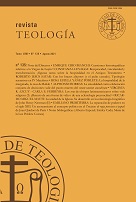With Open Arms (and Fist Closed) Narrative Typologies in IV Maccabees
DOI:
https://doi.org/10.46553/teo.58.135.2021.p59-77Palavras-chave:
Esquemas narrativos, IV Macabeos, Ficcionalización, Exegética históricaResumo
Projection of mythical time has found a favorable way to develop itself by getting inside the group of the historical books of the Bible. In that scheme, hospitality takes a very important place. Specially, if we consider the fact that the people of Israel has been considered as a foreigner into the empires which immense exten- sions subjugate it. On the basis of this context, the moments when Hebrews openly fight with these empires will be significant. Then, we will analyze in this work the Fourth Book of Maccabees because it fictionalizes a historic period of strong and hard confrontation. We understand that into it both narrative procedure of historical circularity and the hospitality as a cultural topic are conjugated, to build with clear and unambiguous marks the text's central characters. That is why we will try to find features that can be typificated in an opposition scale [positive/negative]. Such graduation will allow to understand the relative importance that hospitality will have to clarify the final victory -moral and military- of the sons of God's army.Downloads
Referências
Allport, Gordon W. La naturaleza del prejuicio. Buenos Aires: Eude- ba, 1977.
André, Alessandra. «A basileia em construirlo: a vitória como símbolo de legitimacáo política no século IV a. C.», en Perspectivas interdisciplinarias sobre el mundo grecolatino, ed. Rodrigo Laham Cohén. Buenos Aires: Rhesis, 2017,172-181.
Barclay, John M. G. ]eios in the Mediterranean Diaspora. Edinburgh: T&T Clark, 2001.
Boyer, Alain y Maurice Rubén Hayoun. La historiografía judía. México D. I’.: FCE, 2008.
Buckley, Terry Aspects ofgreek liislon/ 750-323 BC. A Source-Based Ap- proach. London-New York: Routledge, 2010.
Cavallero, Pablo Adrián. Leer a Homero. Ilíada, Odisea y la mitología griega. Buenos Aires: Quadrata, 2014.
Collins, John J. Between Athens and Jerusalem. Jexvish identity in the Hellenistic Diaspora. Livonia: W. B. Eerdmans Publishing Co, 2000.
Daniélou, Jean. Los santos paganos del Antiguo Testamento. Buenos Aires: Carlos Lohlé, 1960.
Druille, Paola. «"Nuestro consejo de ancianos": Filón y la institución administrativa de la comunidad judía de Alejandría en Contra Flaco», Stylos 27 (2018): 80-91.
--------. «Filón y las inscripciones griegas de los siglos II-I a.C.: la existencia de la gerousía en Alejandría», Circe 20 (2016), 131-145.
--------. «La situación cívica de los judíos en los tratados de Filón», Synthesis 22 (2015): 125-38.
Eco, Umberto. Construir al enemigo y otros escritos. Buenos Aires: sudamericana, 2013a.
--------. «Sobre el símbolo», en Sobre literatura. Buenos Aires: Sudamericana, 2013b, 151-169.
Forciniti, Mariel. «Gobernar es persuadir: intentos de rebelión y tácticas para conservar el poder en la sociedad olímpica», en "¿A quién, otra vez, he de persuadir?" Intercambios discursivos entre hombres y dioses en la épica y la tragedia griegas, eds. María Inés Crespo y Hernán Martignone. Buenos Aires: EFFyL-UBA, 2014, 67-95.
Frenkel, Diana Lea. «Las muertes de Antíoco IV», en Los estudios clásicos ante el cambio de milenio. Vida, muerte, cultura, eds. Rodolfo Buzón, Pablo A. Cavallero, Alba Romano y María E. Stein- berg. Buenos Aires: EFFyL-UBA, 2002, 509-18.
--------. «Una visión del Egipto Ptolemaico según la Carta de Aristeas a Filócrates», Circe 10 (2005-2006): 157-175.
--------. «El martirio en la Septuaginta: II y IV Macabeos», AFC 24 (2011a), 59-91.
--------. «La institución de la monarquía en el relato bíblico», Stylos 20 (2011b): 7-34.
Gallegos, Luciana. «Las normas sociales y el vínculo de syngéneía: la legitimación de Alejandría en Argonáuticas», en El nomos transgredido. Afectaciones poéticas de la normatividad en el mundo griego antiguo, eds. Emiliano Buis, Elsa Rodríguez Cidre y Alicia Atienza. Buenos Aires: Editorial de la FFyL-UBA, 2006, 415-443.
Garner, Richard. «Law and Drama», en Law and Society in Classical Athens. New York: Routledge, 1987, 95-130.
Gilí, Christopher, Norman Postlethwaite, Richard Seaford eds., Reciprocity in Ancient Greece. Oxford: Oxford University Press, 1998.
Hall, Edith. «Lawcourt Dramas: Acting and Performance in Legal Oratory», en The Theatrical Cast of Athens: Interactions Between Ancient Greek Drama and Society. Cambridge: Cambridge University Press, 2006,146-169.
Hoces de la Guardia, Ángel. «La hospitalidad en Homero». Gerión 5 (1987), 43-56.
Kolm, Serge. Reciprocity. An economics of social relations. Cambridge: CUP, 2008.
Liddell, Henry George; Robert Scott; Henry Stuart Jones, A Greek-En- glish Lexicón. Oxford: Oxford University Press, 1996.
Lona, Horacio. «Los apologistas griegos: de la defensa de la fe al discurso de propaganda», en Hermenéutica de los géneros literarios: De la Antigüedad al Cristianismo, ed. Marta Alesso. Buenos Aires: EFFyL-UBA, 2013,1-34.
Niese, Benedikt ed., Antiquitates ¡udaicae. Flavii Iosephi opera. Berlín: Weidmann, 1955.
Perea Morales, Bernardo. «Ciertas connotaciones entre Yavé y Zeus», EClas 35/103 (1993): 7-26.
Pinero, Antonio. Literatura judía de época helenística en lengua griega. Madrid: Síntesis, 2007.
Rahlfs, Alfred ed., Septuaginta, id est Vetus Testamentum graecae iuxta LXX interpretes Vol. 1-2. Stuttgart: Württembergische Bibelan- stalt, 1971.
Renehan, Robert. «The greek philosophic background of Fourth Macea bees», RhM 115/3 (1972): 223-238.
Saulnier, Christiane. La crisis macabea. Estella: Verbo Divino, 1983.
Sayar, Roberto Jesús. «He dicho: pueblo salvado. Esquemas narrativos y jurisprudencia en IV Mácateos», en Un milenio de contar historias II. Los conceptos de ficcionalización y narración de la Antigüedad al Medioevo, eds. Andrea Vanina Neyra y Liliana Pégolo. Buenos Aires: EFFyL-UBA, 2020, 227-245.
--------. «"No es imitación de hombres [...] sino de la existencia"
(Poet. 1450al6). ¿ Dispositivos teatrales en IV Mácateos? », en Tránsitos, pasajes y cruces en las teatralidades del mundo, eds. Marcela Coria, María Eugenia Martí, Stella Maris Moro. Rosario: Stella Maris Moro - ATEACOMP, 2015, 351-361.
Shipley, Graham. El mundo griego después de Alejandro 323-30 a.C.. Barcelona: Crítica, 2001.
Van Henten, Jan Wilhelm. The Maccabean martyrs as Saviours of the Jeioish People. A study of 2 and 4 Maccabees. JSJSup 57. Leiden: Brill, 1997.
Van Thiel, Helmut ed., Leben und Taten Aleksanders von Makedonien, Darmstadt: Wissenschaftliche Buchgessellschaft, 1974.
Weitzman, Steven. «Plotting Antiochus's persecution». Journal of Biblical Literature 123/2 (2004): 219-34.
Downloads
Publicado
Como Citar
Edição
Secção
Licença
Direitos de Autor (c) 2021 Teología

Este trabalho encontra-se publicado com a Licença Internacional Creative Commons Atribuição-NãoComercial-CompartilhaIgual 4.0.


















 Teología
Teología